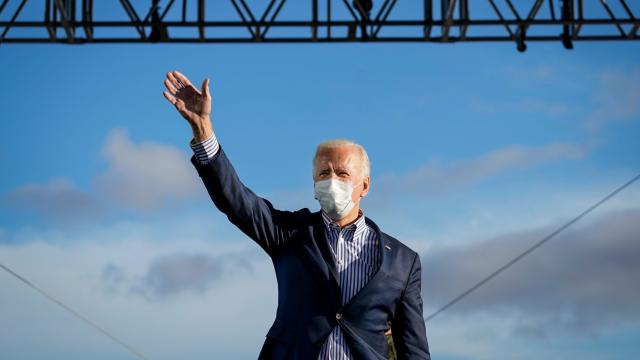The past four years have felt like screaming underwater. The results of the U.S. election are a tentative gasp of fresh air, sharp and somewhat bitter on the back of the throat.
Former Vice President Joe Biden has won the White House according to multiple outlets, after flipping enough states in Upper Midwest and Sun Belt from Trump’s 2016 map. The slightly astringent taste, though, is the Senate. Democrats are poised to force two runoffs in Georgia that will likely decide control of the Senate, and with it a pathway to more aggressive climate legislation. Absent those seats, that leaves Biden in a position to use the power of the pen and the executive branch to do what he can to preserve a habitable planet.
The U.S. has never had climate president, but Joe Biden is poised to be its first. It’s a role he had to grow into bit by bit. His closing pitch, largely driven by relentless climate activists, focused on the climate crisis. They, along with presidential candidates in the Democratic primaries ranging from Washington Gov. Jay Inslee to Senators Bernie Sanders and Elizabeth Warren, pushed climate change to the centre of the political discourse. So did the climate itself, with a crescendo of unnatural disasters that became impossible to ignore.
[referenced id=”1525040″ url=”https://gizmodo.com.au/2020/10/how-a-biden-administration-could-fight-climate-change-without-the-senate/” thumb=”https://gizmodo.com.au/wp-content/uploads/2020/10/31/acgslwfq68unn9hbbu7l-300×169.jpg” title=”How a Biden Administration Could Fight Climate Change Without the U.S. Senate” excerpt=”Somewhere between a dream and nightmare is this scenario for Jan. 20, 2021: Joe Biden becomes president, while the Senate remains in Republican control.”]
Yet for all that effort and voters’ concerns, the end result of the 2020 election is not a resounding endorsement of the U.S. pursuing much-needed policies to rapidly decarbonise and secure a place in the 21st-century economy. How aggressive his agenda looks will depend largely on the continued pressure of activists on Biden to do what he can and on the public at large to understand the gravity of the situation.
Biden’s first attempt at a climate plan was mediocre, though light-years beyond anything seen in any previous presidential race. But due to decades of inaction, more ambition than ever is needed. There’s some evidence Biden heard the calls of activists and scientists. He has said climate change is the “number one issue facing humanity.” And he released a second, more aggressive plan to decarbonise the U.S. electric grid by 2035 and pour $US2 ($3) trillion over four years into climate-safe infrastructure upgrades, clean jobs, and environmental justice. It’s a far cry from the Green New Deal and the $US16 ($22) trillion presidential primary rival Sanders committed, and it wouldn’t come close to decarbonising the U.S. fast enough to keep warming within 1.5 degrees Celsius of pre-industrial levels, a degree of warming that rising above would essentially commit the world to stark suffering.
But any outlay for that plan could depend on the Senate. If Democrats win the Georgia races, it would lock up Senate control and a pathway to major structural reforms. Senate Minority Leader Chuck Schumer told journalist Ananda Giridharadas that “big, strong, aggressive climate agenda that takes into account working people, takes into account racial injustice” would be part of an FDR-style first 100 days for Democrats if they have unified control of Congress and the White House. And Democrats spent a good chunk of the past two years crafting plans they could pull off the shelf.
If Republicans maintain control of the Senate, the outlook for a habitable planet (or at least the U.S. not being a climate pariah) dim significantly. That’s because funding any new climate initiatives would require Senate Majority Leader and self-described “grim reaper” Mitch McConnell’s cooperation.
This is the man who said in the weeks before the 2010 midterms that the “single most important thing we want to achieve is for President Obama to be a one-term president.” He also presided over a Senate that ignored coronavirus relief packages for months while rushing to confirm Amy Coney Barrett to the Supreme Court with Trump in office. Given the evidence, the odds of him agreeing to a spending package that sets aside trillions of dollars for strong, green recovery are abysmal.
That said, Biden can still make parts of his climate agenda happen. Rejoining the Paris Agreement is a bare minimum effort he has committed to, and it’s notable he tweeted it would be a day-one policy even as votes were still being counted. He could — and needs to — go further internationally, and it’s something he could do without Congressional approval. The oft-repeated “personnel is policy” holds true, and so we’ll have to see if Biden nominates climate champions for key roles in his cabinet and throughout government. Banning oil and gas extraction on federal lands, eliminating Trump’s rollbacks, implementing more stringent pollution rules, and using federal procurement policies to green supply chains throughout the world are also totally feasible actions his administration can take from day one.
That will require sustained outside pressure on his administration as well as the courts, which have been stacked with conservative Trump nominees. Those outside groups like the Sunrise Movement and teenagers rallying for their future have public support for their goals, but the mixed results of this election show there’s still a long way to go to make sure everyone understands the stakes.
Writing in the Sunrise Movement’s Winning a Green New Deal, Justice Democrats’ Waleed Shaheed Girgenti describe the coming challenge as one that “will require language, ideas, and coalitions that cannot be retrieved, readymade, from the past.”
Building that new coalition and creating something new and durable is where the work will be. It feels patently absurd we’ve had to wait so long for the fate of the planet to take even this small step toward centre stage in Washington, DC, or the fact that there are still battles to be fought.
Right now, Biden’s win is a fleeting taste of fresh air. The fight stay above water is just beginning.
